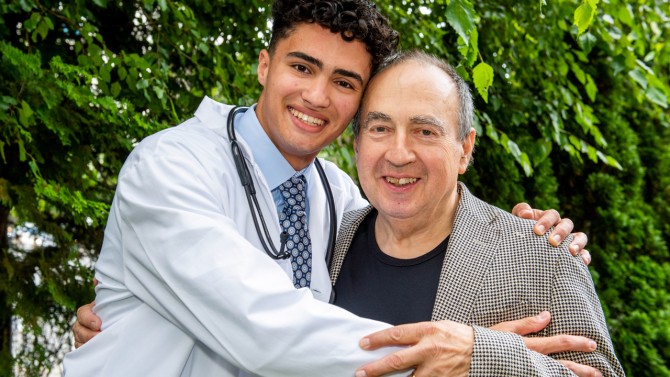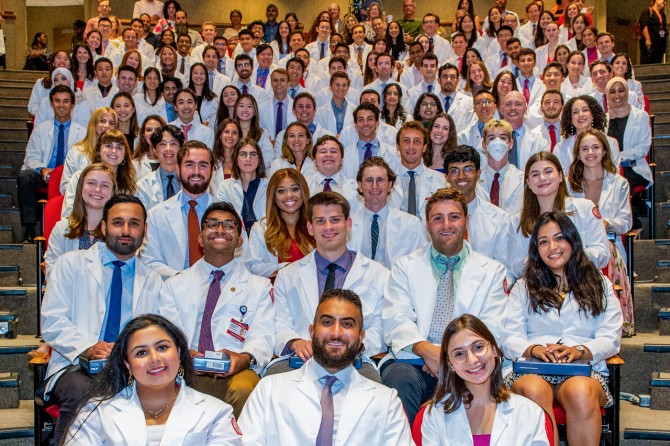Class of 2027 launches medical journey with white coats
By Kathryn Inman and Alyssa Sunkin-Strube
In the summer of 2019, Nick Rosenfeld was preparing to start his freshman year at Loyola University, Chicago – the first in his family to attend college. He had a nagging cold that he simply couldn’t shake and grew increasingly concerned when he started to shed weight.
Toward the end of summer, he coughed up blood. His parents rushed him to the emergency room, where he was initially diagnosed with pneumonia and prescribed antibiotics. But then, three weeks before college orientation, Rosenfeld developed a high fever and ended up back in the ER, where a pulmonologist gave him a surprising diagnosis: tuberculosis.
“I was super thankful for the physician I saw, who worked with me one-on-one to cater my treatment plan, allowing me to start school on time with restrictions,” said Rosenfeld, now 22, from the Chicago suburb of Evanston. “Being in a hospital bed, having lost all agency, feeling like the world was collapsing in on me and having somebody walk in, convey what was going on, how I was going to get through this and that everything was going to be OK, I had never seen someone impact another person more directly in my life. And having experienced that, I knew I couldn’t see myself doing anything else.”
Rosenfeld is now one step closer to achieving that aspiration as a first-year medical student at Weill Cornell Medical College. On Aug. 15, he and 105 of his classmates in the Class of 2027 received their short white coats during the annual White Coat Ceremony, officially marking the beginning of their medical education.
In front of friends and family in Uris Auditorium, students also received stethoscopes provided by the Moss Family Foundation and the Paul F. Miskovitz, M.D. ’75 Stethoscope Fund for Medical Students.
“The White Coat Ceremony is one of the most celebrated academic events at Weill Cornell Medicine. It is the bookend ceremony to graduation, where students receive their first white coat as a rite of passage into the field of medicine,” said Dr. Yoon Kang, senior associate dean for education and the Richard P. Cohen M.D., Associate Professor of Medical Education. “The white coat serves as the uniform of our noble profession but, far more importantly, it is a symbol of a commitment to humanism and to the care of the patient.”
Eugenia Lee, 23, always had an interest in medicine – her father and grandparents were in the profession. As a computer science major at the University of Chicago she was keen to explore the intersection of technology and health care, but it was the experience of volunteering at a hospital in college that solidified her passion for helping others.
At the UChicago Medicine Comprehensive Cancer Center, Lee had the opportunity to engage with patients individually—to hear their stories, try to understand their needs and ensure their comfort while receiving treatment, which could take hours at a time. She found it gave her the most inspiration and joy.
“I realized I felt most at home whenever I was talking one-on-one with patients,” said Lee, a native of Pittsburgh.
Dr. Linnie Golightly, M.D. ’83, associate dean of diversity and inclusion at Weill Cornell Medicine and this year’s white coat speaker, reflected on the “odd mystical effects” of the coat in her address: “People will treat you differently after you have been vested with a white coat, almost a kind of reverence. And if you are not careful, you too may be taken under the spell of your attire.”
Invoking the accomplishments of notable alumni like Dr. Frank Douglas, M.D.-Ph.D. ’77, and Dr. Peter Hotez, M.D. ’87, as well as her own family's history, Golightly implored the students to “be ever vigilant in upholding our solemn duty to protect the sacred rights of those in our care.”
“Know that the Ghanaian saying is true for you: That while the one clearing the path doesn’t know that it’s crooked behind them, you who are following can see the rough, uneven grass. [...] Use all the powers vested in you by the coats you will receive today.... and it will be a straighter, more just path.”
For Rosenfeld, his experience as a patient – and later as the relative of a patient – informed his medical ambitions. His father lives with a rare disease called transthyretin amyloidosis, which occurs when abnormal proteins produced by the liver build up in the heart’s left ventricle. The disease put his father into heart failure and led to a heart attack in late July. Now in recovery, he was strong enough to travel to New York City and attend his son’s white coat ceremony in person.
“I was the first to graduate college in my family and graduation was a huge deal,” Rosenfeld said. “He’s now seeing me don that white coat and share in the excitement of being at such an amazing institution. Whether or not he’ll get to see me graduate isn’t promised, so we’re making the most of these moments. I couldn’t be more excited to give him a big hug with that coat on and make him proud.”
Kathryn Inman is senior institutional news writer and Alyssa Sunkin-Strube is newsroom manager for Weill Cornell Medicine.
Media Contact
Get Cornell news delivered right to your inbox.
Subscribe


